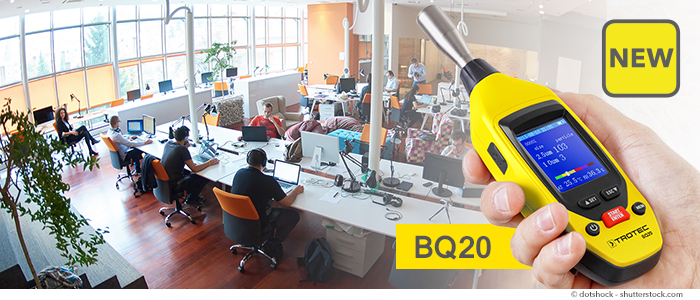Fine dust. You can’t see, smell, or taste it – but it is everywhere. Fine dust is considered highly dangerous to health, and can for example lead to respiratory afflictions, heart diseases, an increase of asthma attacks and lung cancer. What many people don’t know is that fine dust pollution is often higher indoors than on the street. In order to determine these values, a particle measuring device like the BQ20 is required – our compact new environmental measuring unit for detecting fine dust pollution, air temperature and humidity.
For a long time the amount of fine dust outdoors has been of higher priority, whereas indoor pollution has been wrongfully neglected. At home, the air is polluted through cooking, roasting, hoovering as well as through the use of laser printers and copiers, or through the use of open fireplaces and pellet heaters. Particulates are a danger to health in the work place as well, for example in skilled trades, through soldering, welding and milling, as well as through laser printers and copiers in the office. You can precisely determine the extent of particulate pollution at home or in the workplace with the BQ20 particle measuring device – as well as whether your countermeasures are effective.
Dreaded particulates are composed of a complex mix of varied particles – and the BQ20 measures the ambient air’s content of these fine dust particles. A basic principle applies: The smaller the particle, the more dangerous it is, as it is then able to move through the airways into the deepest layers of the lungs and from there can get into the bloodstream and all other organs of the body. Particulates are therefore divided into different fractions depending on their size:
- The PM10 particulate fraction, also known as inhalable dust, includes all particles that can be breathed in and penetrate the nasal cavity. Their aerodynamic diameter is smaller than 10 micrometres.
- The PM2.5 particle fraction, also known as respirable dust, includes all respirable fine particles that can penetrate the bronchial tubes and alveoli. Their aerodynamic diameter is smaller than 2.5 micrometers.
How it works
With the BQ20 you can detect particulate fractions as being PM10 and PM2.5 at the same time according to the common international PM Standard (particulate matter). In addition, the BQ20 measures the quantitative concentrations of airborne inhalable (PM10) and respirable (PM2.5) dust and shows on its colour display the measured amount of the particle per channel or the numerical proportion per cubic meter of ambient air. Moreover, it informs you of the status of the current particle pollution with a coloured bar graph indicator. In this way, with the BQ20 you can at all times quickly and reliably receive quantitative notifications about the prevalent fine dust concentration.
Furthermore, the measuring device enables you to activate an acute alarm when a certain predetermined value is exceeded – an especially useful function to alert you, if the BQ20 is regularly used in an unchanging environment.
Four of the many advantages that I particularly like:
- The compact environmental measuring unit for measuring fine dust pollution and climate data
- The 2-inch colour display that indicates all measured parameters at the same time
- Memory for up to 5,000 data sets
- The direct conversion and display of the concentration of inhalable or respirable dust contained in the ambient air in micrograms per cubic meter of air
BQ20 particle measuring device – perfect for monitoring air quality
The BQ20 includes an integrated tripod socket and comes with a practical base as well a mains charger, which also allows for operation while saving batteries with longer measurement series with up to 5,000 data sets that can be recorded in the internal memory.
Order the BQ20 particle measuring device today for our current offer of £361.59 reduced from £452.01 incl. VAT – now in the Trotec shop!


